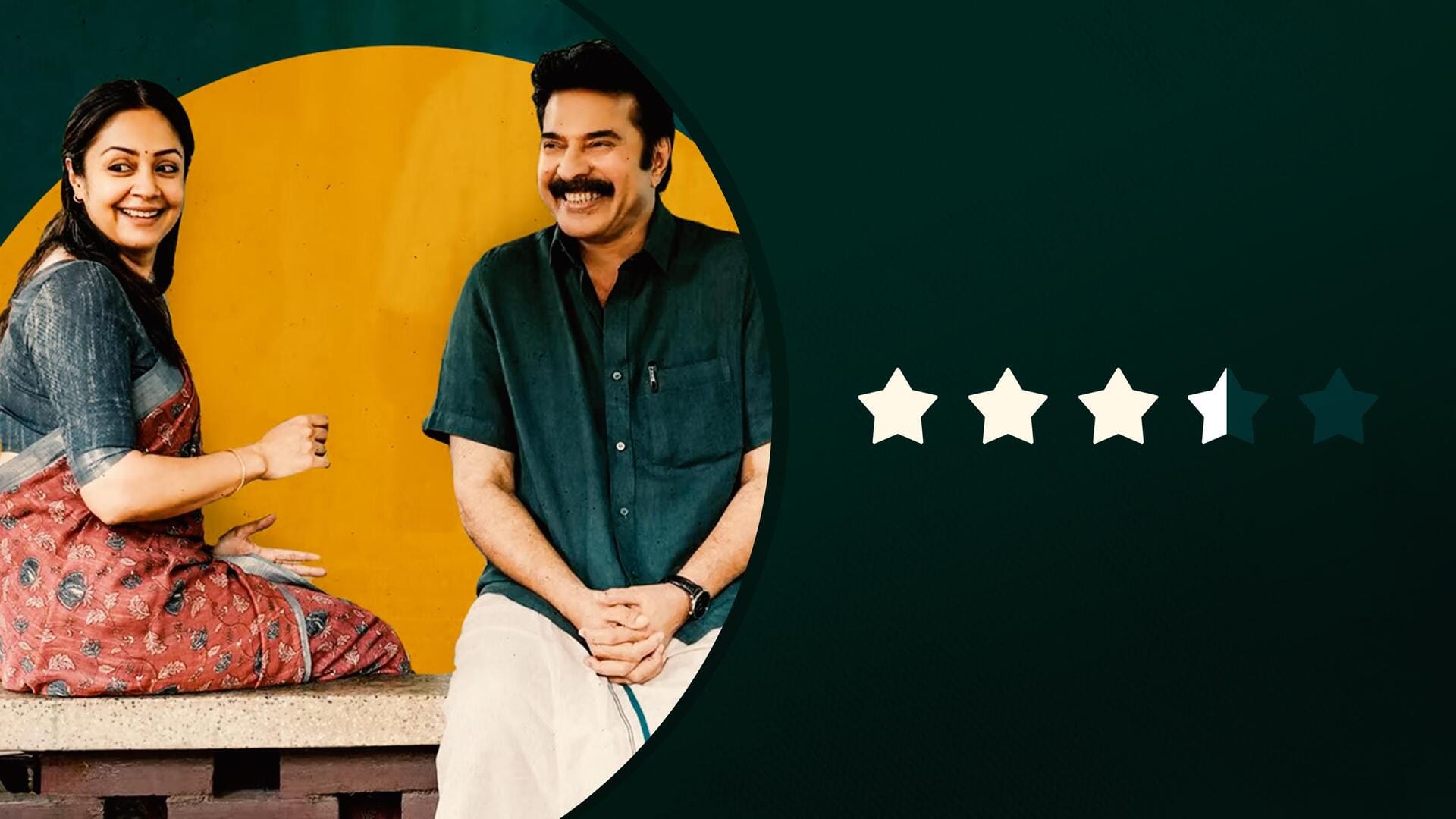
'Kaathal—The Core' review: Audacious LGBTQ+ drama bolstered by astounding performances
What's the story
Jeo Baby's Kaathal—The Core—now streaming on Amazon Prime Video, is the kind of drama that you could spend hours dissecting; a film you want to continue rolling even after the end credits. A sensitive, audacious, gentle, and progressive film that's not shackled by conservatism or melodrama, KTC bats for homosexual relationships while also demonstrating the harrowing state of affairs that impedes the LGBTQ+ community.
Plot
Plot of the film
The fairly simple, straightforward plot revolves around Mathew and Omana, played by Mammootty and Jyothika, respectively. Married for 19 years, their fraught relationship is now coming apart at the seams. Mathew is gay and Omana finds herself suffocated in this loveless marriage where they're familiar strangers, and demands a divorce. Since he is an aspiring local politician, the "scandal" soon blows up.
#1
Opening credits and setting of the film
The choice of opening the film with a church is interesting—religion and homosexuality are often at loggerheads, and Mathew-Omana are shown to be regular church-goers. Baby architects the film's world brick-by-brick and we learn more about Mathew—as someone who is a product of his circumstances, his own reality and truth are shoved in the background as he keeps languishing under the weight of perfection.
#2
He's a reluctant 'hero'
To elaborate on Mathew, he's a reluctant character through and through, always doing what others ask him to; as a closeted gay man, he has, after all, never known the concept of choice/freedom. Mammootty's decades of artistic experience glisten on his face—Mathew is always brooding, lost in his thoughts, carrying about the rigmarole of life—a way to escape and abandon his own thoughts.
#3
The relationship between the married couple
Baby builds up Omana-Mathew's relationship carefully—the cracks in their marriage are like festering wounds that get worse with each passing minute. Their first interaction occurs past the 20-minute mark and even then, it's perfunctory—it's so labored that it almost seems to be a task. Later on, however, we realize that while love is lost, they continue to be allies and each other's strongest supporters.
#4
More on the lack of marital bliss
Baby pulls you into his world by constructing carefully choreographed and deeply affecting emotional shots and yet, the film never ventures into the melodramatic or preachy territory. Omana and Mathew are never at the risk of being underdeveloped and despite a less than two-hour runtime, we know enough about them to sympathize with them. They're both prisoners, both looking for a space to breathe.
#5
How will the separation help them?
The film is as much about Omana's willingness to walk out of a marriage that exists only on paper as it is about Mathew's struggle to fathom who he really is, and who he wants to be. He's a man worried about the crumbling of his meticulously formed personal and professional life, accepting his homosexuality isn't a "burden" he can take upon himself.
#6
More on their divorce
The divorce scene in Kaathal might be one of the very few cinematic divorce scenes where everyone breaks into smiles. There's no cacophony, no shouting contests, no wishing evil upon each other. The importance of second chances is further accentuated when Omana tells Mathew that the divorce will emancipate both of them, not merely her. "Don't you want to rescue yourself?" He is speechless.
#7
Thankan is introduced as Mathew's (closeted) lover
The treatment of Thankan-Mathew's relationship left me high and dry and I kept hoping for a few scenes that could have explored their love. What we get, however, are glances stolen at each other, a sense of overwhelmingness, a palpable desire to embrace each other, and a common wish—to love each other without being crucified for it. A love, unfortunately, behind closed doors.
#8
Metaphors and narrative devices
KTC makes repeated usage of cars, car mirrors, windshields, doors, windows and other similar closed spaces while focusing on interpersonal relationships—both when it's about coming together and drifting away. In one of my favorite scenes toward the end, Thankan catches a glimpse of Mathew from his car's rearview mirror—the hailstorm has passed and the objects in the mirror are finally closer than they appear.
Verdict
The film gets 3.5/5 from us
Despite being underwritten and feeling a bit abrupt in a few sequences, KTC is never unwatchable; we whip up immense sympathy for Mathew, Thankan, and Omana—an emotion that doesn't falter throughout the drama. It's about one's struggle with oneself, the binds of societal obligations, and the necessity to give ourselves—and others—a second chance. If you watch one film this weekend, make it this one.